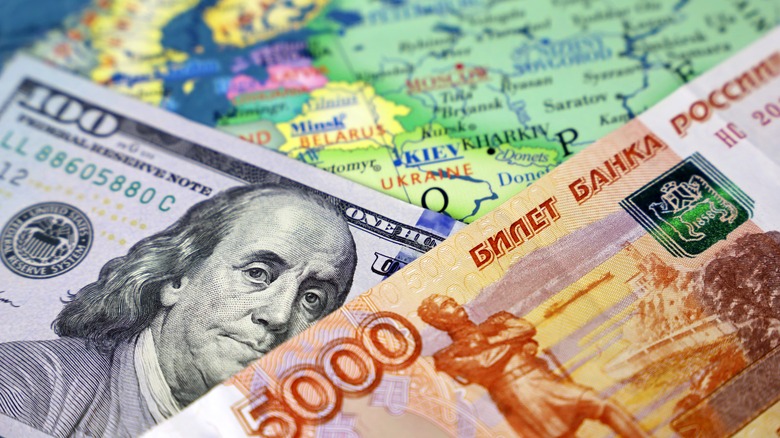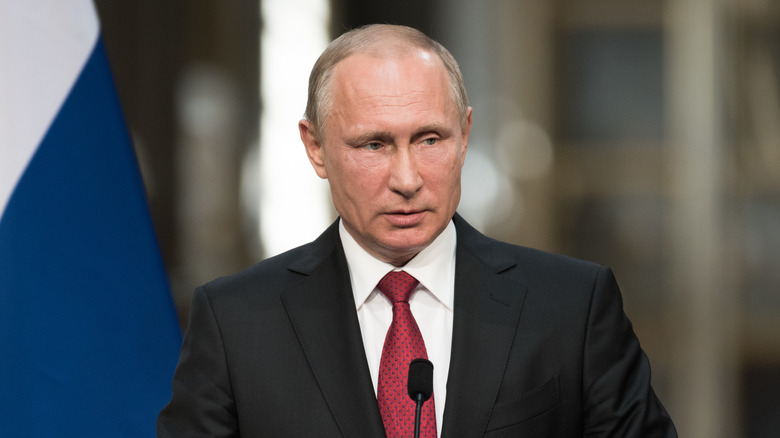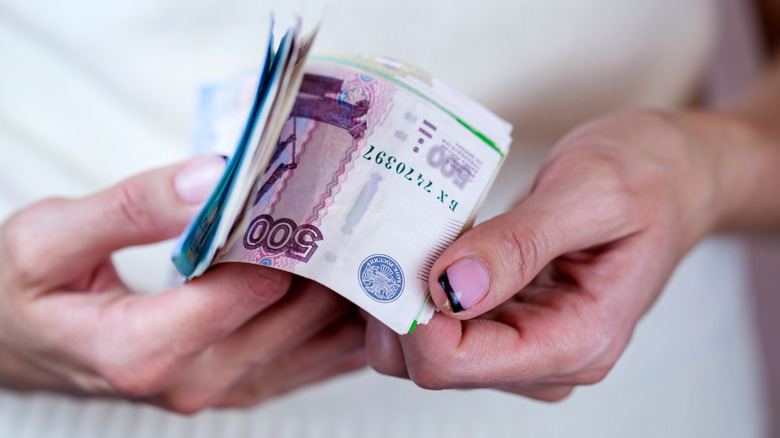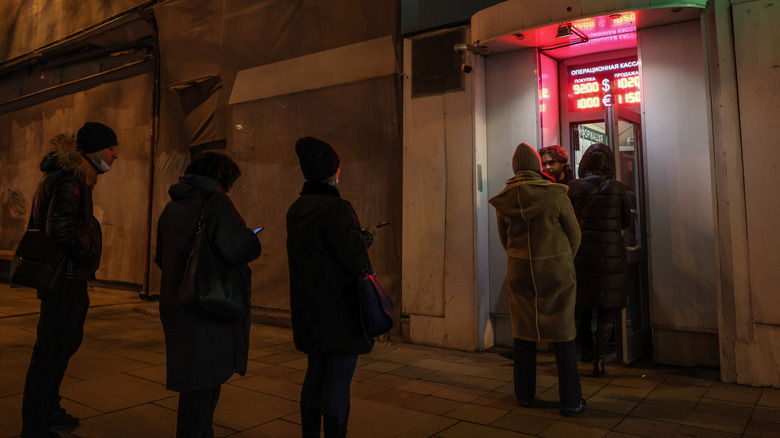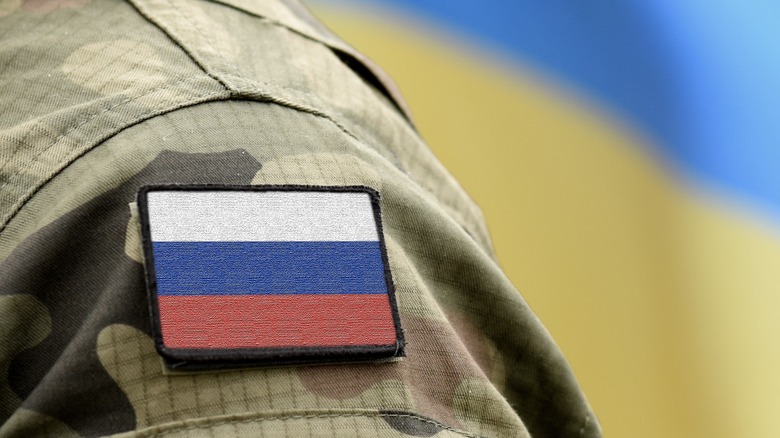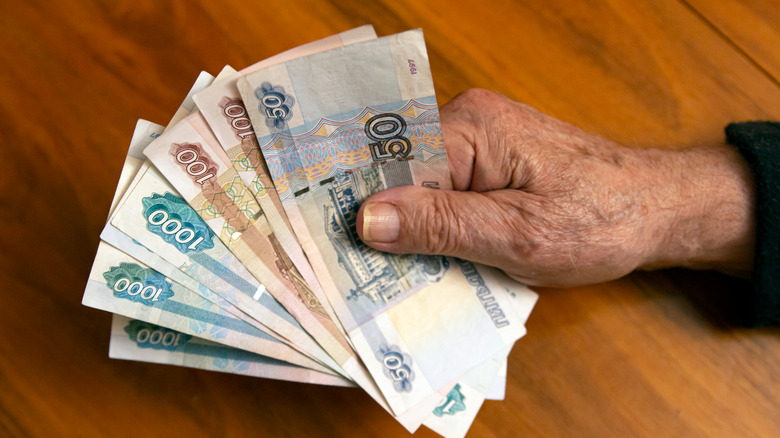What Happens If A Country Doesn't Repay Its Debt To Other Countries?
If you've ever taken out a personal loan from your bank, you know how it's supposed to work. You get the cash you need for medical expenses or a new car, and you repay that money later, with interest, by a set date. And if you don't pay it back, there are lots of different ways that your creditor can try to get their cash back, from dropping your credit score to seizing your car or house (via Lending Tree). A personal bankruptcy can have a negative impact on your ability to secure credit at a decent rate for years afterward. It takes significant amounts of time and dedicated, hard work to clear up an incident, or even a period, of failing to repay loans on a personal level.
Individuals borrow money, and various businesses of all sizes and configurations frequently borrow money as well, whether it's a tech startup, an independent film, or a nation-wide retailer. Going even further, countries borrow money, too. A nation seeking to borrow money might work with an international financial institution, but it's also common for a country to reach out and ask other countries to lend them money (via Investopedia). So what happens if one country borrows money, and then doesn't pay it back?
It's more common than you might think. According to The Balance, defaulting on debt is a common situation that has happened worldwide in almost every country at least once. As FinTechExplained reports, Spain defaulted more than 15 times before 1939. In more recent times, Greece defaulted in 2015, while Venezuela defaulted in 2017.
Why did Russia default?
The situation is more common than you might think. The impact is wider as well. It's one thing for a private citizen to miss a credit card payment; it's quite another for an international entity to default on repaying a loan as agreed and promised. One recent case of notable loan default happened when Russia was supposed to repay certain international bonds by April 4 (via CNN). To avoid a total default, Russia tried to repay some of its debts in rubles, since it could not access its U.S. currency. This is called a "selective default" — a country pays back some of its debts, while not repaying the total amount.
Russia tried to repay a bond debt in rubles when it should have paid in U.S. dollars. The problem with that is that currency fluctuates in value. The ruble dropped about 40% in value after the Ukraine invasion earlier this year. As a result, right now, it would take about 79 rubles to match one U.S. dollar.
So why can't Russia pay back its entire amount of debt? Well, they do technically have the money — there is a currency reserve holding about $315 billion (via CNN). But this reserve was frozen when Russia invaded Ukraine, prompting the U.S. to impose strict sanctions.
Currency devaluation
Russia was allowed to repay its loans with some of these funds but was not allowed to remove the money from American banks, and instead had to use devalued rubles (via CNN). Russia has now threatened legal action, without specifying who exactly the country is planning to sue (per Reuters).
In general, when a country defaults on loan repayment, a cycle of consequences kicks in (per FinTechExplained). The biggest and first consequence is usually that the country's currency can undergo devaluation, making the currency lower in value compared to other countries' money. So one ruble could theoretically be worth the same as one U.S. dollar — and after a devaluation, like the recent 40% dip in value, one ruble would be worth just 60 cents compared to one U.S. dollar.
The Balance reports that after currency devaluation, the country will work to restructure its debts with its creditor. This usually means picking a new date for repayment or reducing the amount of money that needs to be repaid — but sometimes the currency will be devalued further.
Real-life impacts
Per FinTechExplained, currency devaluation doesn't just affect the government — it has real-life impact on citizens, too. People may gather at banks to try and withdraw all their money, causing a banking crisis. As The Balance reports, this has lasting impact: public debt can accelerate by two-thirds in the years following a banking crisis.
Unlike when an individual person defaults on debts and can have their property repossessed, that won't happen to a country (via FinTechExplained). But not paying back a loan can sour relationships between the two countries, which can lead to increased tensions and even military action.
One of the most lasting impacts on the country is that its name can be tarnished, and other countries might avoid lending to it in the future. The United States has a good track record of repaying international loans and has never defaulted on its debts, so it is considered a reliable country to provide a loan at low-interest rates (via Management Study Guide). But countries that have a smaller GDP or less government stability do tend to default on their loans, and over time, this can erode trust and make other countries less likely to give them another loan in the future. And there are other consequences, too.
Too unstable for a loan
The stock market can also be affected if people think it is too risky to invest in a country's unstable currency (via FinTechExplained). All of this can lead the country's GDP to drop by a few percentage points for a year or more.
And it really matters how stable the country is — the less stable the region, the higher their future interest rates will be when they do seek out another loan. Per Reuters, in Russia's case, their country was considered stable until very recently. Before now, Russia hadn't defaulted on a loan in quite some time, as it has properly repaid loans for at least the last 100 years.
Overall, there is no way to make a country pay back a loan if it doesn't want to, unlike a personal bank loan (per Management Study Guide). The country that defaults on its loan can be ostracized from the global bond market too. Many countries utilize this bond market to grow their nation — and without external credit, small countries can find it difficult to function well.
Finding a solution
Luckily for these countries, even when they do fail to repay their loans, a solution is usually worked out pretty quickly (per Management Study Guide). To avoid severe international consequences, the country will often work to pay back its debt over a longer period of time. After all, the creditor would rather have some of the money repaid than none at all. But the lending country might take action that's essentially punitive — perhaps raising interest rates, reducing the defaulting country's credit limits, or imposing other restrictions to avoid a future loan default and reduce the risk.
Despite all of those potential negative impacts, there can be positive outcomes from loan defaults, too (via FinTechExplained). Having a devalued currency can create a lucrative situation for exporters because if their product is cheaper, other countries might want to purchase more of their goods. A devalued currency is also adored by tourists, who can visit that country inexpensively and get more for their money. But when it comes to Russia, The Harvard Gazette reports, the effects of this loan default are just another type of sanction among the many already leveled since Russia invoked the Ukrainian conflicts.
